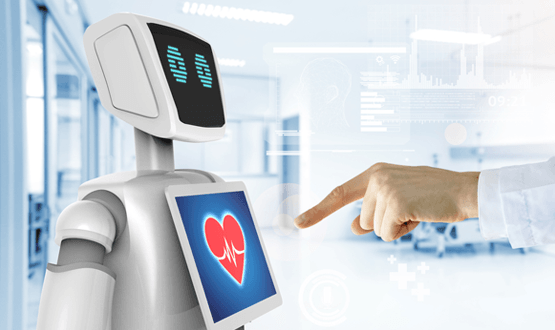Robo-docs and AI could ‘save NHS £12.5bn a year’, claims Darzi report
- 18 June 2018

The NHS could shave off a tenth of its budget by assigning nearly a third to robots and machine learning systems, a new report has claimed.
Penned by surgeon and former health minister Lord Darzi, the report suggests the NHS could achieve cost savings of £12.5bn a year by fully automating repetitive and administrative tasks, such as communicating medical notes, booking appointments and processing prescriptions.
It further suggests that “home help care bots” designed to help people move around the home, help with household maintenance and even wash, dress and feed themselves, reducing the human workload by 30%.
Published by think tank IPPR and due to be released to the public next week, the report claims that automation will serve to complement human workers and free up more time for direct patient care, rather than resulting in mass unemployment.
In total, robots and AI systems could take on approximately a third (31%) of the workload currently faced by GPs, a quarter (23%) of that of hospital doctors and 29% of that of nurses, it says.
It points out that technology will also help to fill a void left by a shortage of frontline staff in health and social care.
While many of the machine-led tasks would be mundane in nature, the report also sets out a more fanciful vision of the hospital of the future.
For example, bedside robots designed to shuttle meals to patients as well as help them in and out of bed may become a common sight on the ward, Lord Darzi proposes.
Meanwhile, tapping the full potential of machine learning and artificial intelligence (AI) systems in diagnostics could enhance the speed and accuracy of diagnoses, particularly for conditions such as pneumonia, eye diseases, heart conditions and different types of cancer, the report claims.
Biosensors will also allow the remote monitoring and alerting responses to clinical observations, such as sepsis, it adds.
“In the 21st century NHS, it might not be the sound of a bedpan dropping that is heard in Whitehall, but that of a robot picking it up,” says the report.
Lots of potential, even more barriers
While IPPR makes no reference to the potential cost or timeline for achieving such a high level of sophistication, it acknowledges “myriad barriers” facing the NHS in realising this utopia-like vision, including “a lack of investment in the technological infrastructure; a need to redesign care pathways around automated solutions; and to retrain impacted staff to perform new roles.”
However, the report stresses that “the opportunity is too great to ignore”, and new funding for health and social care – due to be announced by Theresa May next month – should include “a sizeable automation strand with a remit to invest in the required infrastructure and to help staff re-design care pathways around it.”
The Prime Minister recently cited artificial intelligence as a key tool in medical research and the diagnosing of diseases such as cancer.
Great Ormond Street Hospital recently announced a partnership with Microsoft to explore how AI and other cutting-edge technologies can transform healthcare delivery.
The report concludes: “Automation [has] the potential to transform the social care sector by connecting support at home, in residential care, and in hospitals, thereby smoothing the transitions between these settings.
“There is huge potential for smart homes that include point-of-care diagnostics together with remote monitoring meaning that people will be able to live independently, secure in the knowledge that help is close at hand if their condition deteriorates.
“The future is full of possibilities where robots empower people in old age, enabling better, longer, and more fulfilling lives. Wider application of social digital technology at all ages will enable more people to remain supported and connected to friends and family.”




2 Comments
Whilst the front line applications seem fanciful at present other industries who held the same view initially are reaping the benefits of adoption now.
One area for quick wins is back office functions where routine transaction processing and checking devours a huge amount of NHS spend that could be diverted to front line care if these were automated. The cost of robotics to support this has dropped dramatically over the last few years whilst the proven returns have materialized faster due to the shortening deployment time making the investment very attractive now.
A nasty case of blueskyitis, there Lord Darzi.
If the patient read enough Blue Sky horizon-scanning reports eventually the patient thinks he (and it is always a he) loses the ability to tell the difference between the horizon and reality.
Was very prevalent in Monitor.
Comments are closed.